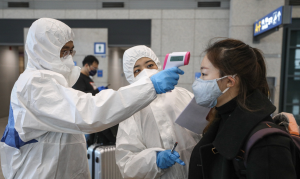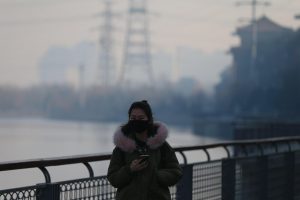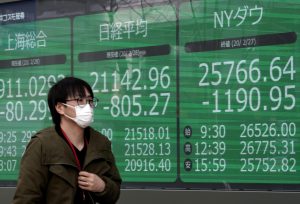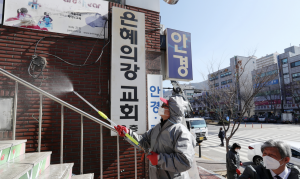
Almost two months. The world has changed: a new virus has caused the death of thousands of people, locked down cities – even countries – and thrown the global economy into crisis. But something seems not to be changed, as usual. The national governments are demonstrating their unwillingness to cooperate against a common menace: every country is fighting against the coronavirus with its own approach, its own decisions and emergency measures. In East Asia, China, Japan and South Korea are the perfect example of isolation and lack of ability to share information even during a pandemic crisis on a planetary scale. As if the virus respected the national borders.

A woman protects herself from coronavirus wearing a face mask in Pechino, China
«Our life is slowly starting again» – Filippo is Italian born, but he has been living in China for more than 10 years. He’s married to a Chinese woman and he has a daughter. All his life is in Ningbo, an 8-million-people city near Shangai. «How far is Wuhan from here? Well, it depends on what you mean when you say “far” in China. It is 700 kilometers away», Filippo says. In Ningbo, the first emergency measures against the spread of coronavirus appeared on January 20: «The security guards had the power to prevent us from leaving the apartment blocks. We had limited permissions to go in and out: only one for each family, a couple of times a week, to get something to eat». For more than one month only food stores had the right to stay open.
When the Chinese government decided to close roads, railroads and bridges, people were not allowed to go around. Filippo’s voice is calm and hopeful, broken by a slow sigh when he tells about the last weeks: «We accepted the restrictions and shared some good time all together at home, playing, reading and watching movies. I could count on the smart-working and my daughter took remote lessons».
Only two weeks ago the system changed. The social media app WeChat, used by people in their everyday life, was deployed with the personal state of health. «In the subway, at my workplace, everywhere I go, there are barcodes to scan with my phone: if a green light appears, it means that I am healthy. And I can continue walking around». Something that recalls the Big Brother Eye, nothing too strange under dictatorial rules. «People are happy, because they’ve always had clear rules to follow. I have to admit that the Chinese authorities have been able to contain, or even solve the problem. After two months of sacrifices, our life is slowly starting again».

A display in Tokyo, Japan, shows the effects of coronavirus on the world’s stock markets
«The greatest change is about working hours» – The full implications of this virus seem not to be understood from the Chinese experience by Japan. Keigo is 40 years old and he is from the northernmost island of Japan, Hokkaido. He lives in Iwamizawa, near Sapporo, and he tries to explain how the outbreak has been perceived: «Only a couple of weeks ago, we understood that the situation was getting worse». However, «compared to China and Korea, not so many people have died here. Especially young people think that this is not their problem». In addition, Japan will host the 2020 Olympic Games, with all the social and economic implications: «The government considered the possibility to close the links between Japan and China, but the economic impact prevailed».
At the end of February, some contingency measures were activated: theaters, concert halls, schools the universities have been closed. And Keigo’s life completely changed: «I’m a pianist. I can neither play music, nor accompany the chorus, because every crowded meeting has been canceled. I can only teach piano “one to one” and I hope that it won’t be forbidden, as well». The malls and the restaurants are still open, even if very few people go there in these days. Keigo is a waiter, too, «but we’re working very little and slowly». You can see the concern in his eyes while he reflects about his immediate future: «The greatest change concerns how many hours I spend working. I think I won’t be able to earn that much money at the end of March…» On the other hand, «I’m quite at ease, I don’t think I had relations with infected people. I pay attention to avoid contacts with the elders, because I don’t want to put them at risk somehow. There’s some alert and the authorities ask to stay at home».

Sanitization of public places in Seoul, South Korea [Yonhap News Agency]
All the crowded events have been canceled until the end of April and the companies have planned the smart-working or, at least, staggered hours, in order to prevent crowded trains and subways. However, «we can continue going out, using masks», Alessandro says. The government immediately intervened to ration its sale: «Every week you can buy no more than 2 masks, only if you are allowed to. For example, the health authorities say: “Today, everyone who is born in a year ending with 3 o 8”. Me and my girlfriend had a try some hours ago, but all the masks were sold out».
Alessandro put the attention on the sense of responsibility and community showed by South Koreans: «Some makers of soju, South Korea’s national spirit, decided to provide ethanol for sanitizers, donating a 20 percent of their stockpiles of alcohol used for the production of suju». The emergency is far from over. But South Korea seems to have rediscovered solidarity in the national community through the fight against coronavirus.





